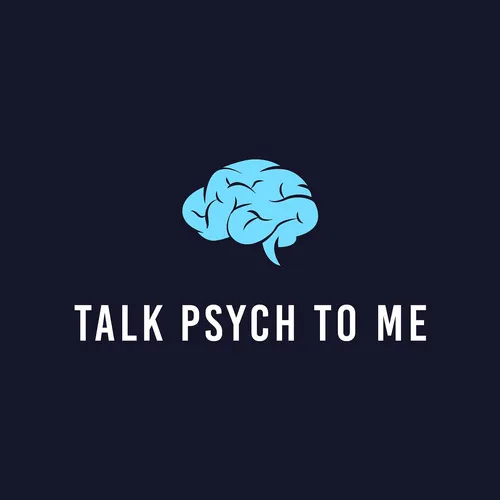
Talk Psych to Me
Let's get psychology out of the lab and into the streets. Join hosts Tania Luna (psychology researcher) and Brian Luna (total layperson) as they turn fascinating research into practical tips for getting better at being human.
- Update frequency
- every 9 days
- Average duration
- 43 minutes
- Episodes
- 60
- Years Active
- 2020 - 2022

Dreaming: Demons and brain dumps
Can psychology help us understand the mysterious worlds we visit and lives we lead while we're asleep? In this episode, we tackle questions like: Why do we dream? What do our dreams mean? Why didn't …

Discussing Disgust: Onions, poop, and Hitler's sweater
Mucus. Puss. Maggots. Feces. Eating bats. Eating cows. Racism. In this episode, we discuss the benefits and dangers of disgust and tackle some tough questions like: Is anything objectively disgusting…

Problem Solving: Unicorn flute problems (with Thomas Wedell-Wedellsborg)
Thomas Wedell-Wedellsborg, author of What's Your Problem? joins us this week to talk about the psychology of problem solving. Learn his top tips for problem reframing and how to become a skillful pro…

Aging: Water other people's tulips
In honor of Brian's birthday, we talk about the psychology of age and aging. Does being slightly older or slightly younger than your classmates in school impact you later in life? (Spoiler alert: yes…

Empathy: Step outside your yard
Come join the Luna family debate about empathy. Does it do more good or harm in a zombie apocalypse? How about in today's world? What exactly is empathy anyway? And how can we learn to use it well?
Ta…

Perseverance: My dad's voice in your head
As quarantine drags on, we have to shift out of crisis mode and into Perseverance Mode. In this episode, we learn from neuroscience, prisoners of war, homelessness, and Brian's dad to unpack the psyc…

Luck Psychology: As luck would have it
Just what is luck, exactly? How does it play a role in our lives? Are some people luckier than others? Can an overdose of luck result in 'luck guilt'? And what can all of us do to become luckier?
Tal…

Profanity: The importance of being f*@king earnest (with Vaneeta Sandhu)
Special guest, psychologist Vaneeta Sandhu, joins the show this week to talk about the psychology of cursing. Why do we do curse (or is it cuss)? Can other animals swear? How does profanity impact us…

Outtake: the laughing plague
A strange thing happened while we were recording Episode 11 on the topic of infectious mass reactions. We had one ourselves.
Did it happen to you too?! Tell us over:
Instagram: @talkpsychtomepodcast
Em…

Panic Psychology: Hold onto your peanuts
We are up again two infections right now: COVID-19 and panic. In this episode, Tania and Brian break down the psychology of mass panic (like panic shopping, dance plague, and penis panic), moral pani…

Nonverbal Communication (Part II): Doctors without neck tats
Continuing from PART I of the episode on nonverbal communication, Brian and Tania talk about the significance of time in communication (aka chronemics), artifacts, paralinguistics, and cross cultural…

Nonverbal Communication (Part I): Professor X skillz
Is 93% of all communication really nonverbal? Find out if this famous psych stat is truth or lore. See why Professor X puts the x in proxemics: the study of space in communication. Then head over to …

Popularity: Stop trying to make popular happen
What makes someone popular or unpopular? What are the pros and cons of popularity? And what was Brian's social status in high school?
Talk psych to us:
Instagram: @talkpsychtomepodcast
Email: tp2mpodca…

Cognitive Dissonance: Busting makes you feel good
Got cognitive dissonance? Learn helpful tips for either lying to yourself about it or growing as a person.
Talk psych to us:
Instagram: @talkpsychtomepodcast
Email: [email protected]
Bonus: Watch R…

Time Perception: Time is on your side
Ever feel like you don’t have enough time or that time is dragging on? Sure, we can’t control clock time, but we can learn to control brain time.
Talk psych to us:
Instagram: @talkpsychtomepodcast
Ema…

Winning & Losing: How to lose like a champion
Let's talk winning and losing psychology, including body language, power posing, almost losing, almost winning, BIRGing, CORFing, and how to be a great loser.
Talk psych to us:
Instagram: @talkpsycht…

Hope & Helplessness: Thunderdome babies
Understand learned helplessness and its flip-side, learned hope. Discover a new thing you can blame on your parents. Find out why optimism can get us into trouble, but hope can make us live longer. A…

Self-Control: Dangling your own carrot
What is self-control, when do you need it, and how do you get it? In this episode, Brian and Tania talk amygdala hijacking, road rage, delay of gratification, and willpower hacking. Collect new self-…

Emotional Misattribution: Your brain is hanging upside down
Tania and Brian explore emotional misattribution - when we think we're feeling one thing, but we're actually feeling something else. They talk about hanger, nervous-excitement, sexy fear, The Ramones…

Cuteness Psychology: Of cute mice and ugly babies
Tania explains the psychology of cuteness, cute aggression, happy tears, and dimorphous expressions. Brian tries to understand how being ugly as a baby might have impacted his life. Together, they ex…